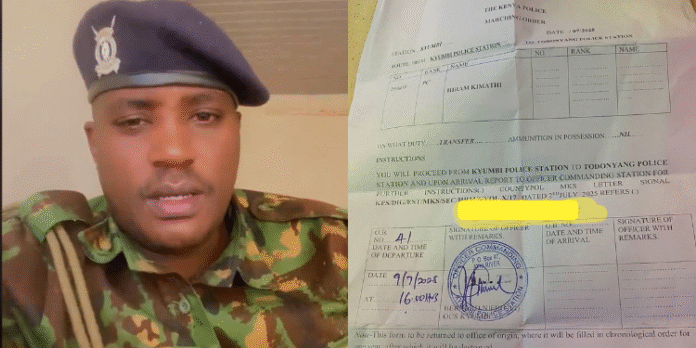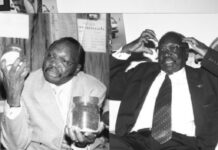Nairobi, Kenya – Police officer Hiram Kimathi has spoken out defiantly after his recent transfer to Tondonyang in Turkana County, claiming the move was punitive and aimed at silencing his critical voice within the National Police Service (NPS).
In a candid interview, Kimathi described the transfer as malicious and retaliatory, saying it followed his outspokenness on issues affecting the police service.
“Sack me if you want. I will not be intimidated for speaking the truth,” said Kimathi, who believes his reassignment was not only targeted but also symbolic of a deeper dysfunction within the NPS.
“Why me, in the whole nation? Why are you transferring Hiram Kimathi alone?” he questioned, noting that he had anticipated the move but hoped for better judgment from his superiors.
The officer, who has served in remote and high-risk zones — commonly referred to as “forward areas” — says he had expected a posting closer to urban centers to allow him to raise his family.
“I am not eligible to go back to the forward areas. My work is done there,” he said, asserting that the transfer to Tondonyang, a remote outpost located about 180 kilometers from Lodwar, was not a reflection of operational needs but a clear punishment for his outspoken views.
Kimathi lamented what he views as a missed opportunity by the NPS to use his voice to bridge the growing gap between law enforcement and the public, especially in advancing the community policing agenda.
“The relationship between the police and the citizens needs to be repaired. My voice could have helped do just that,” he added.
Despite the circumstances, Kimathi says he remains unshaken and unafraid of losing his job.
“Nobody was born employed. If I lose this job, I will go back to society and start again,” he said.
While Kimathi clarified that Tondonyang is not inherently a punishment post — acknowledging the dignity of those serving there — he emphasized that the intention behind his transfer was punitive.
“The people there are not being punished. But for me, it’s a punishment because I spoke out,” he said.
His remarks have sparked public debate about the state of internal accountability and freedom of expression within the police service. Civil society actors have previously raised concerns about whistleblower suppression and systemic resistance to reform in the ranks.
As the story unfolds, it remains to be seen whether Kimathi’s bold stand will prompt broader conversations — or further consequences — within Kenya’s security establishment.
Written by Were Kelly



















